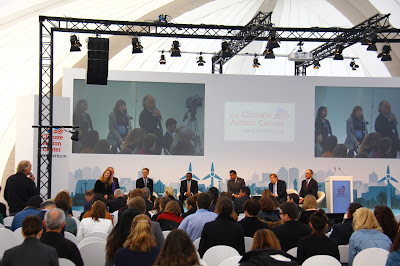The Politics of Monitoring GHGs
By: Will Kochtitzky
Last week, I wrote a blog post about how we are increasingly monitoring greenhouse gases (GHG) from space. These efforts have been led by the European Union, US, and Japan Space Agencies with the launching of several satellites that are now measuring carbon dioxide and methane concentrations around the world every day from space.
Last week, I wrote a blog post about how we are increasingly monitoring greenhouse gases (GHG) from space. These efforts have been led by the European Union, US, and Japan Space Agencies with the launching of several satellites that are now measuring carbon dioxide and methane concentrations around the world every day from space.
 |
| CO2 concentrations as measured from NASA's OCO-2 satellite (2014-2016) |
How we measure emissions is something that has long been disputed. Measuring emissions is not so easy because uncertainties abound in how much carbon is actually emitted and absorbed. Many of the measurements are theoretical and rely on models. Countries have entered into schemes of trading carbon credits and have other creative methods of emissions accounting. This makes the need to measure observed emissions even more important as countries produce theoretical emissions estimates, we want ways to aid that process and make it more robust. Satellites offer a clear alternative to this traditional form of emissions accounting as they can continuously monitor every place on Earth and provide robust measurements over a continuous space. This is greatly improved from theoretical measurements or point observations.
Validation - a dangerous word
When it comes to emissions monitoring from space, validation is an incredibly dangerous word. Validation means a game of gotcha, where rich countries (i.e. Japan, the EU, and USA) monitor the emissions of the rest of the world and validate their reports. Many countries see this as a violation of their sovereignty and will never agree to be validated. This creates some sticky political situations for countries to navigate. This has given rise to language such as “support” and “monitor”. In negotiations at the COP where words are everything and validation is not allowed in the GHG emissions space.
I am excited to keep following the Global Stocktake as countries make renewed pledges in the next years in an attempt to ratchet up ambition, at least we hope they do.



Comments
Post a Comment